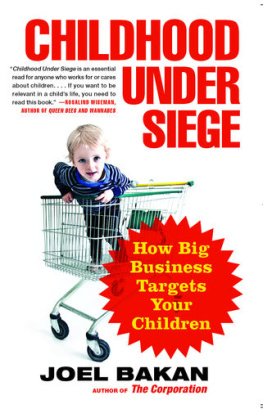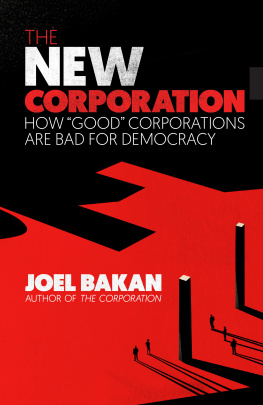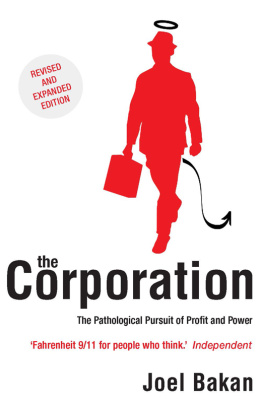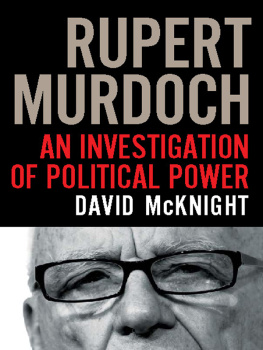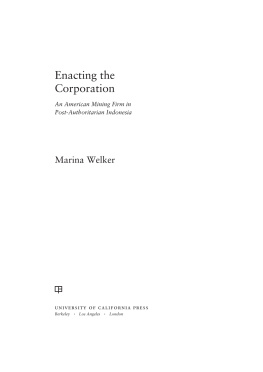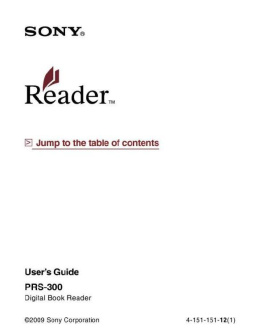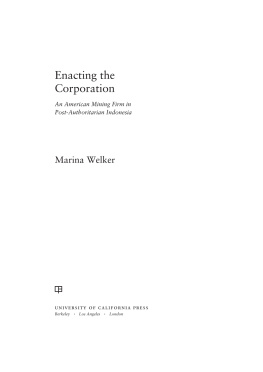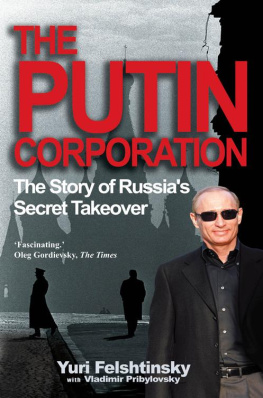PRAISE FOR THE CORPORATION
A surprisingly rational and coherent attack on capitalisms most important institution.
The Economist
Bakan does such a good job of creating awareness that it cant help but be a call to action.
USA Today
Bakan... takes a powerful stab at the most influential institution of our time, the corporation.... [An] eye-opening look at a system programmed to exploit others for profit.
Booklist (starred review)
Bakans analysis is strong on pinpointing problems with current business.
Harvard Business Review
His prose is soothing, free of scholarly clottedness and leftist stridency. The reader is impressedthrilled evento watch him coolly denude the corporate person until it stands naked and vulnerable....
The Vancouver Sun
All senior business executives should find the time to read this well-researched and well-written book.... The Corporation will force you to reflect on what really matters, both in ones life and in ones company.
The Globe and Mail
Bakan is a first-rate storyteller, and his tales are compelling and even hair-raising.
Dragonfly Review
Insightful.... Whether youre pro-business or against... [Bakans] research gives the project weight and suggests constructive solutions.
San Francisco Chronicle
The corporation, according to Joel Bakan, is the monster that can swallow civilizationgreedy, exploitive, and unstoppable. We are all its potential victims, which is why we must all understand how the corporate form makes it so difficult to control its abuses.
Alan M. Dershowitz, Felix Frankfurter Professor of Law, Harvard Law School
Joel Bakans The Corporation is one of those rare books that opens up a new world. Its message is compellingand more important now than ever. With exquisite historical evocations and incisive contemporary examples, the author challenges us to recognize the flaws inherent in the very nature of the corporation and the practical possibilities for reform. You will want to have the book at hand for frequent reference for many years to come.
Robert A. G. Monks, Deputy Chairman of Hermes Focus Asset Management and corporate governance adviser
Since Rachel Carsons Silent Spring began to expose the abuses of the modern industrial system, there has been a growing awareness that profit at the expense of Earthof individuals, society, and the environmentis unsustainable. Joel Bakan has performed a valuable service to corporations everywhere by holding up a mirror for them to see their destructive selves as others see them. The clarion call for change is here for all who would listen.
Ray C. Anderson, Chairman and CEO of Interface, Inc.
This fine book was virtually begging to be written. With lucidity and verve, expert knowledge and incisive analysis, Joel Bakan unveils the history and the character of a devilish instrument that has been created and is nurtured by powerful modern states. They have endowed their creature with the rights of personsand by now, rights far exceeding persons of flesh and bloodbut a person that is pathological by nature and by law, and systematically crushes democracy, freedom, rights, and the natural human instincts on which a decent life and even human survival depends: the modern corporation. This incisive study should be read carefully, and pondered. And it should be a stimulus to constructive actionnot at all beyond our means, as the author outlines.
Noam Chomsky, Ph.D., Professor of Linguistics, Massachusetts Institute of Technology and author of 9-11
Contents
For Marlee
Introduction
As images of disgraced and handcuffed corporate executives parade across our television screens, pundits, politicians, and business leaders are quick to assure us that greedy and corrupt individuals, not the system as a whole, are to blame for Wall Streets woes. Have we just been talking about some bad apples? Sam Donaldson recently asked former New York Stock Exchange chief Richard Grasso on ABCs This Week, or is there something in the system that is broken? Well, Sam, Grasso explained, weve had some massive failures, and weve got to root out the bad people, the bad practices; and certainly, whether the number is one or fifteen, thats in comparison to more than ten thousand publicly traded corporationsbut one, Sam, just one WorldCom or one Enron, is one too many. Despite such assurances, citizens todayand many business leaders tooare concerned that the faults within the corporate system run much deeper than a few tremors on Wall Street would indicate. These larger concerns are the focus of this book.
A key premise is that the corporation is an institution a unique structure and set of imperatives that direct the actions of people within it. It is also a legal institution, one whose existence and capacity to operate depend upon the law. The corporations legally defined mandate is to pursue, relentlessly and without exception, its own self-interest, regardless of the often harmful consequences it might cause to others. As a result, I argue, the corporation is a pathological institution, a dangerous possessor of the great power it wields over people and societies. That raises a number of questions, which I address in subsequent chapters. How did the corporation become what it is today (Chapter 1)? What is the nature, and what are the implications, of its pathological character (Chapters 2 and 3) and of its power over society (Chapters 4 and 5)? And what should and can be done to mitigate its potential to cause harm (Chapter 6)? These are the central questions that inform the book. By revealing the institutional imperatives common to all corporations and their implications for society, I hope to provide a crucial and missing link in peoples attempts to understand and do something about some of the most pressing issues of our time.
Peter Drucker, perhaps the worlds leading management thinker, was one of the first to analyze the corporation as an institution in his groundbreaking 1946 work, Concept of the Corporation. It was Drucker who thought it significant that all corporations have the same institutional order and purpose. For most of us, however, the daily details of corporate life tend to obscure the bigger picture. Like Pfizer CEO Hank McKinnell, we have great difficulty thinking of corporations as an institution. We understand them, instead, mainly in terms of how they differ from one anothertransnational versus local, high-tech versus smokestack, progressive versus traditional, cool versus stodgy, blue-chip versus risky, brand name versus no-name, good versus badand miss the fact that all corporations, at least all publicly traded ones, share a common institutional structure; that it makes sense to talk about the corporation, as well as corporations. As veteran Harvard Business School scholar Joe Badaracco remarked when asked the simple question What is a corporation?: Its funny that Ive taught in a business school for as long as I have without ever having been asked so pointedly to say what I think a corporation is.
The Corporations Rise to Dominance
Over the last 150 years the corporation has risen from relative obscurity to become the worlds dominant economic institution. Today, corporations govern our lives. They determine what we eat, what we watch, what we wear, where we work, and what we do. We are inescapably surrounded by their culture, iconography, and ideology. And, like the church and the monarchy in other times, they posture as infallible and omnipotent, glorifying themselves in imposing buildings and elaborate displays. Increasingly, corporations dictate the decisions of their supposed overseers in government and control domains of society once firmly embedded within the public sphere. The corporations dramatic rise to dominance is one of the remarkable events of modern history, not least because of the institutions inauspicious beginnings.

